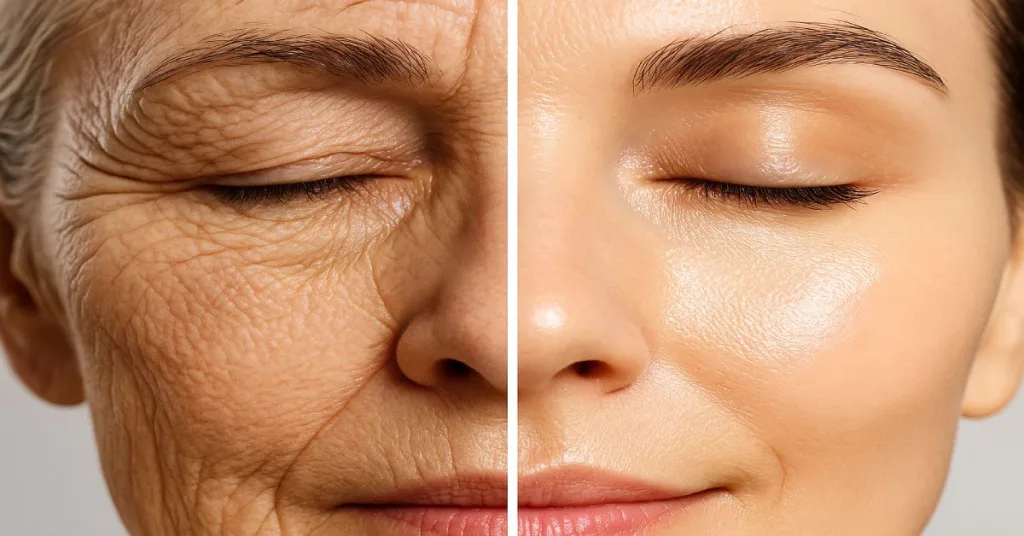Why Collagen Took Over the Beauty World
Collagen supplements are everywhere right now — powders, gummies, and capsules promising glowing skin, thicker hair, and nails that never break. Walk into any supplement aisle or scroll through TikTok, and you’ll see the hype everywhere. Celebrities stir collagen into their morning coffee. Influencers swear it’s the secret to looking younger.
But is collagen really the “fountain of youth” in powder form — or just another clever marketing gimmick draining your wallet?
This post may contain affiliate links. If you click and purchase, I may earn a small commission at no extra cost to you. I only recommend products I personally use or have thoroughly researched.
What Collagen Actually Is
Collagen is the most abundant protein in your body. It’s the scaffolding that holds your skin, bones, tendons, and ligaments together.
In skin specifically, collagen provides firmness and elasticity. As we age, natural collagen production declines, which is why skin sags and wrinkles form.
The idea behind supplements is simple: give your body more raw materials, and it might slow down or reverse visible aging. But the science is more nuanced.

Do Collagen Supplements Survive Digestion?
One of the biggest criticisms is that collagen gets broken down into amino acids during digestion — just like any other protein.
However, research shows collagen peptides (smaller chains of amino acids) can survive digestion and get absorbed into the bloodstream. These peptides may signal the body to ramp up its own collagen production.
So yes — collagen supplements aren’t “destroyed” the way skeptics claim. But whether that translates into visible results depends on the product and consistency.
The Science on Skin, Hair, and Nails
Collagen’s strongest evidence is in skin health. Recent meta-analysis of 26 randomized controlled trials shows that hydrolyzed collagen supplementation significantly improves skin hydration and elasticity when compared to placebo — meaning your cream might only be half the battle.
- Multiple clinical studies show daily collagen peptide supplementation improves skin hydration, elasticity, and reduces wrinkle depth after 8–12 weeks.
- Some research suggests collagen may strengthen brittle nails and support hair thickness, though evidence here is weaker compared to skin.
- Results vary: some people see smoother skin, others see very subtle changes.
The key? Consistency. You won’t see results overnight. Most studies used daily doses of 2.5–10 grams of collagen peptides for at least 2–3 months.
Other Supplements That Support Skin Health
Collagen isn’t the only player in skin health. These nutrients work synergistically:
- Vitamin C: Required for collagen synthesis in the body.
- Zinc: Supports wound healing and skin repair.
- Hyaluronic Acid: Improves hydration and elasticity.
- Silica: May contribute to hair and nail strength.
If your diet is lacking these, collagen alone won’t give you glowing skin.

Best Delivery Forms: Powders vs Capsules vs Gummies
Collagen supplements now come in every form imaginable. Which is best?
- Powders: Most popular, easy to mix into drinks, usually the best value per gram.
- Capsules: Convenient but often underdosed (you’d need multiple capsules to equal one scoop of powder).
- Gummies: Tasty, but usually contain the least collagen and the most sugar.
If you’re serious about results, powders are the most cost-effective and reliable option.
How to Choose a Collagen Supplement
When shopping, look for:
- Hydrolyzed collagen peptides (easier to absorb).
- Type I & III collagen for skin, hair, and nails (Type II is more for joints).
- Third-party testing for purity and heavy metals.
- Brand transparency (clear labeling of grams per serving).
Avoid overpriced “beauty blends” that sprinkle collagen into a mix of underdosed ingredients.
Cost vs Benefit: Is It Worth It?
Collagen supplements aren’t cheap. A good powder can run $30–40 per month. But if you’re consistent, studies suggest you may notice improvements in skin hydration and elasticity within a few months.
The bigger picture: collagen isn’t a miracle cure. It works best as part of an overall healthy diet rich in protein, vitamin C, and antioxidants. Think of it as a boost — not the whole solution.
Final Verdict
Collagen supplements are not snake oil — but they’re not magic either. The research supports benefits for skin, with promising (though weaker) evidence for hair and nails.
If you choose the right type, take it daily, and pair it with supportive nutrients, collagen may be worth the investment. Just don’t expect to rewind your age by 20 years.
see also: Best NAD+ Supplements for Longevity & Cellular Health